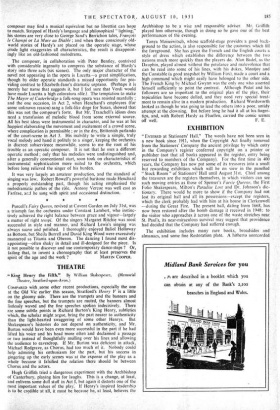THEATRE
COMPARED with some other recent productions, especially the one at the Old Vic earlier this season, Stratford's Henry V is a little on the gloomy side. There are the trumpets and the banners and the fine speeches, but the trumpets are muted, the banners almost listlessly waved and the fine speeches spoken indecisively. There are some subtle points in Richard Burton's King Henry, subtleties which, the scholar might argue, bring the part nearer to authenticity than the light-hearted swaggering of some other Henrys. But Shakespeare's histories do not depend on authenticity, and Mr. Burton would have been even more successful in the part if he had lifted his voice and his head inore often and declaimed a passage or two instead of thoughtfully mulling over his lines and allowing the audience to eavesdrop. If Mr. Burton was deficient in attack, Michael Redgrave, as Chorus, had too much of it. Nobody could help admiring his enthusiasm for the part, but his success in gingering up the early scenes was at the expense of the play as a whole because it falsified the relation there should be between Chorus and the actors.
Hugh Griffith tried a dangerous experiment with the Archbishop of Canterbury, playing him for laughs. This is a change, at least, and enlivens some dull stuff in Act I, but again it distorts one of the most important values of the play: If Henry's inspired leadership is to be credible at all, it must be because he, at least, believes the Archbishop to be a wise and responsible adviser. Mr. Griffith played him otherwise, though in doing so he gave one of the best performances of the evening.
Tanya Moiseiwitsch, whose scaffold-stage provides a good back- ground to the action, is also responsible for the costumes which fill the foreground. She has given the French and the English courts a style of dress which establishes the difference between the two nations much more quickly than the players do. Alan Badel, as the Dauphin, played almost without the petulance and malevolence that can be read into some of his lines, with his dukes, Montjoy and the Constable (a good snapshot by William Fox), made a court and a high command which might easily have belonged to the other side. The French King by Michael Gwynn was the only one who asserted himself sufficiently to point the contrast. Although Pistol and his followers are so important to the original plan of the play, their topicalities have become dulled, and they need very special treat.: ment to remain alive in a modern production. Richard Wordsworth looked as though he was going to lead the others into a poor, untidy attempt at the clowning. But before long he had it all at his finger- tips, and, with Robert Hardy as Fluellen, carried the comic scenes






























 Previous page
Previous page